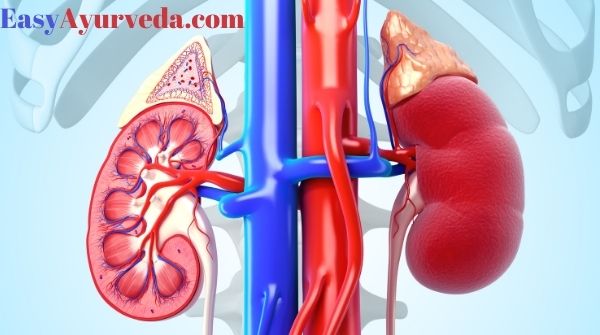Nephritis Causes, Types, Symptoms, Treatment
By Dr Raghuram Y.S. MD (Ay) & Dr Manasa, B.A.M.S
Nephritis is a condition where there is inflammation of the functional units of the kidneys i.e nephrons. This inflammation is also known as glomerulonephritis. It adversely affect kidney function.
Read more about Nephritis – Modern view
Table of Contents
Causes
Nephritis and kidney disease often seem to run in families, which suggests a possible genetic component. Some infections, such as HIV and hepatitis B or C, can also cause nephritis.
Some medications, such as antibiotics, pain relievers, NSAIDs, or diuretic pills can damage the kidney and lead to nephritis.
Read – High Potassium, Kidney Disease and Leaching of Vegetables

Symptoms
· changes in urinating habits
· swelling anywhere in the body, especially the hands, feet, ankles, and face
· changes in urine color
· foamy urine
· blood in the urine
Types
1. Acute glomerulonephritis
2. Lupus nephritis
The symptoms of lupus nephritis include:
· foamy urine
· high blood pressure
· swelling of the legs, ankles, and feet
Other symptoms may include joint problems, fever, and rashes.
3. Alport syndrome, or hereditary nephritis
4. Chronic glomerulonephritis
5. IgA nephropathy
6. Interstitial nephritis
Read – Urinary calculi – Home Remedies, Ayurvedic Treatment, Diet, Recipes
Treatment and Prevention
Acute nephritis sometimes resolves without treatment. However, it usually requires medication and special procedures that remove excess fluids and dangerous proteins.
Treating chronic nephritis typically involves regular kidney check-ups and blood pressure monitoring.
Medications that prevent the immune system from attacking the kidneys can also be beneficial in some cases.
A suitable diet will typically be lower in protein, salt, and potassium.
Prevention
Certain lifestyle practices can reduce the risk for many people. These practices include:
· maintaining a healthy weight
· quitting smoking
· keeping blood pressure and blood sugar within healthy limits
· exercising regularly
Eating a nutritious, balanced diet can also help protect kidney health.
Read – Ayurvedic Food Recipe For Kidney, Bladder Cleanse: Ashtaguna Manda
Nephritis In Ayurveda
Vrukka gata pittadhikya – increased pitta and consequent inflammation in the kidneys and nephrons
Vrukka gata shotha / pittaja shotha / vrukka vidaha – inflammation / swelling caused by vitiated pitta in the kidneys / nephrons
Note – The above said Ayurveda terms are coined since we do not find an exact explanation of these conditions in Ayurveda.
Pathogenesis Samprapti
Dosha – pitta pradhana tridosha (aggravation of all the three doshas with predominant vitiation of pitta)
Dushya – mutra, rakta, mamsa, meda
Srotas – Medovaha Srotas, Mutravaha srotas
Sroto dushti lakshana – Sanga / obstruction (following inflammation)
Roga Marga – Abhyantara Roga Marga (kidney being a viscera) / Madhyama Roga Marga (kidney being related to urinary bladder and hence a vital organ)
Sadhyasadhyata – krichrasadhya (curable with difficulty)
Read – Srotas: Body Channels and Duct systems – Easy Explanation
Treatment principles
Shota Chikitsa – treatment line of swelling and inflammation
– especially treatment of pittaja swelling when inflammatory symptoms are present as in lupus nephritis, presence of high blood pressure, rashes, arthritis, inflammation and bloody urine
– treatment of kaphaja swelling when non-inflammatory / edematous swelling is found in the lower limbs and presence of proteins in the urine
Treating high pitta – all pitta controlling measures including diet, medication and therapies
Pitta-Rakta Sroto dushti chikitsa – Treating on the lines of ‘contamination of channels of transportation of pitta and blood’
Medovaha sroto dushti chikitsa – treating ‘contamination of channels carrying fat tissue’ (since fat is involved in the formation of kidney)
Krimi Roga Chikitsa – treating for worms and micro-organisms (to combat infection
Other treatment strategies based on the symptoms of nephritis –
Prameha Chikitsa – principles of treating diabetes especially in presence of foamy urine, changes in urine color, swelling, reduced immunity leading to frequent urinary problems, repeated infection and inflammation, high blood pressure etc symptoms.
Jwara Chikitsa – treatment line of fevers, when severe symptoms of inflammation, fever, joint pains and rashes are present, as in lupus nephritis or acute glomerulonephritis.
Raktapitta chikitsa – treating on the lines of raktapitta i.e. bleeding disorders, especially that which has downward course (i.e. adhoga raktapitta). In this, emesis may be preferred especially if there is swelling (non-inflammatory) in the lower limbs along with bleeding from the urinary tract.
Treating tikshnagni – if the digestive fire in the form of pachaka pitta is severe, the food is quickly digested or burnt. According to Ayurveda this subtype of pitta takes part in the formation of urine after the segregation of nutrients in the gut. The urine might carry the high pitta qualities in presence of tikshnagni. Therefore this condition should be taken care of. Presence of tikshnagni exposes one to pitta type of disorders, anywhere in the body, including kidneys which are mainly inflammatory in nature. In this condition regular virechana and control over pitta and use of pitta pacifying ghee in the food or for drinking will be helpful.
Vatanulomana – regulating vata by enabling its free movement in downward direction will help in flushing off unwanted fluids in the body, reduces inflammation and swelling, and combats high blood pressure. Gandharvahastadi Kashayam along with dhanwantaram gulika or vayu gulika in edematous swelling and unctuous purging using Gandharvahastadi or Nimbamritadi Eranda Taila will help in inflammatory swelling. Triphala Churna, Trivrit lehya, Drakshadi lehyam, Sukumara Ghrita / Kashayam, Patoladi Kashayam and Patolakaturohinyadi Kashayam are beneficial in expelling morbid vata associated with pitta. Combating vitiated vata and pitta will also reduce inflammation in the kidneys, nephrons and prevent kidney damage.
Rasayana Chikitsa – administration of immune-modulators and tissue rejuvenation medicines are highly helpful in nephritis caused by autoimmune reactions. Shatavari Churna, Chandraprabha Vati, Vanga Bhasma, Shilajitu, Amalaki Rasayana, Chyavanaprash etc are helpful in enhancing the immunity among many choices. Shatavari Gulam, Narasimha Rasayana and Shatavari Ghrita too are helpful.
Role of Panchakarma
Vamana i.e. therapeutic emesis and Virechana i.e. therapeutic purgation are the best therapies in combating nephritis. They may be conditionally administered. Yashtimadhu phanta (infusion of Licorice) in high pitta conditions and Madanaphala yoga in kapha-pitta predominance and both forms of swelling are the best choices for emesis. Trivrit Lehya is the best formulation for purging.
Ayurvedic Medicines
Chandraprabha Vati
Shilajtivadi lauha
Shilajit
Gokshuradi Guggulu
Punarnavadi Kashayam
Brihatyadi Kashayam
Vastyamayantaka Ghritham
Click to Consult Dr Raghuram Y.S. MD (Ayu) – Skype









